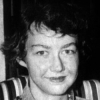Flannery O'Connor

Flannery O'Connor
Mary Flannery O'Connorwas an American writer and essayist. An important voice in American literature, she wrote two novels and 32 short stories, as well as a number of reviews and commentaries. She was a Southern writer who often wrote in a Southern Gothic style and relied heavily on regional settings and grotesque characters. Her writing also reflected her own Roman Catholic faith and frequently examined questions of morality and ethics. Her posthumously-compiled Complete Stories won the 1972 U.S. National Book...
NationalityAmerican
ProfessionNovelist
Date of Birth25 March 1925
CitySavannah, GA
CountryUnited States of America
I write any sort of rubbish which will cover the main outlines of the story, then I can begin to see it.
The problem of the novelist who wishes to write about a man's encounter with God is how he shall make the experience--which is both natural and supernatural--understandable, and credible, to his reader. In any age this would be a problem, but in our own, it is a well- nigh insurmountable one. Today's audience is one in which religious feeling has become, if not atrophied, at least vaporous and sentimental.
the writer is initially set going by literature more than by life.
We hear a great deal of lamentation these days about writers having all taken themselves to the colleges and universities where they live decorously instead of going out and getting firsthand information about life. The fact is that anybody who has survived his childhood has enough information about life to last him the rest of his days. If you can't make something out of a little experience, you probably won't be able to make it out of a lot. The writer's business is to contemplate experience, not to be merged in it.
I never understand how writers can succumb to vanity - what you work the hardest on is usually the worst.
Writing is a good example of self-abandonment. I never completely forget myself except when I am writing and I am never more completely myself than when I am writing.
Ours is the first age in history which has asked the child what he would tolerate learning.
Kindness and patience were always called for ...
The dead don't bother with particulars.
A God you understood would be less than yourself.
I don’t want any of this artificial superficial feeling stimulated by the choir. Today I have proved myself a glutton—for Scotch oatmeal cookies and erotic thought. There is nothing left to say of me.
That's the trouble with you preachers," he said. "You've all got too good to believe in anything," and he drove off with a look of disgust and righteousness.
The Church's stand on birth control is the most absolutely spiritual of all her stands and with all of us being materialists at heart, there is little wonder that it causes unease. I wish various fathers would quit trying to defend it by saying that the world can support 40 billion. I will rejoice the day when they say: This is right whether we all rot on top of each other or not, dear children, as we certainly may. Either practice restraint or be prepared for crowding...
She looked at nice young men as if she could smell their stupidity.